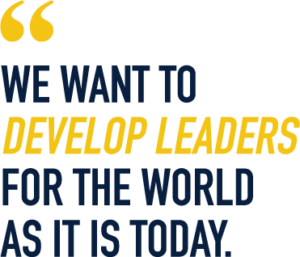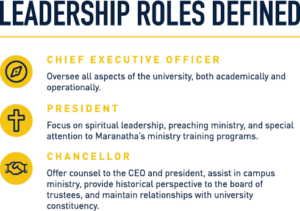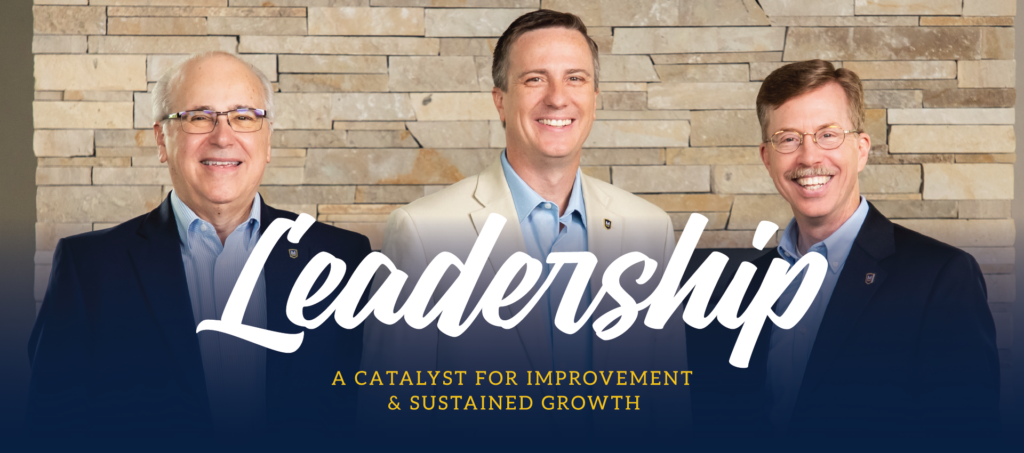Missional Leadership for the Next Generation

When Dr. Marriott announced his appointment to the position of Chancellor in May at commencement, many people immediately began praying for what would assuredly be a time of waiting and transition. Thankfully, God ordained Dr. David Anderson to accept the call from the Board of Trustees in the same month to be the new president. Since May, the Board’s decisions have been repeatedly affirmed as Dr. Anderson has been transitioning his ministry to Watertown from Illinois. His pleasant demeanor and warm spirit are a welcome addition to the team. He brings a contagious fire for ministry. You might ask, “How did we get here?” It’s important to understand that reinstating the role of the chancellor and bringing Dr. Anderson on as president is the culmination of leadership structure improvements in this decade. Maranatha’s leadership legacy serves as a catalyst for improvement and fosters an environment of sustained growth.
![]()
Dr. Marriott took the corner office in 2009. Two of his initial programs to reinvigorate Maranatha’s work were the strategic Bible & Church Ministry scholarship for students preparing for ministry and the systematic expansion of Online & Distance Learning programs. After announcing the scholarship, Marriott recounts, “The scholarship doubled the number of ministry training students in campus programs.” Since 2010, hundreds of thousands of dollars have been given to students seeking to go into vocational ministry debt-free. Reflecting on the centrality of local church ministry to Maranatha’s mission, Marriott often paints a picture of the Bible programs as “the hub of the wheel with spokes coming out from it.” He further explains, “If we can keep our ministry preparation programs strong, the passion for ministry will radiate through all our other programs.” Every week, the entire student body goes out to local churches as active participants in ministry. Dr. Marriott’s careful guidance in building the ministry training programs ensured a future tied to the mission of Maranatha.
In addition to the Bible training scholarship, Dr. Marriott’s vision to build our capacity for online education protected us against financial instability. Though our campus population remains much as it has, our ministry to students reaches coast to coast and beyond each week. Now, students who are returning to the classroom for additional training or to complete their degrees remain plugged into their communities while receiving world-class instruction. Online was never intended to replace the campus but to extend the campus reach and maintain Maranatha’s leading-edge position. As can be seen by the growing number of graduates each year, Maranatha’s community has never been larger. Dr. Marriott signed over half of our alumni’s diplomas before transitioning to the chancellor. With the scholarship recipients going into vocational ministry and the Online & Distance Learning programs reaching ministry-minded students across the globe each year, Maranatha has never had a greater impact for the cause of Christ.
![]()
Marriott may be remembered most for his wisdom in assessing, adapting, and constructing leadership frameworks that will long outlast his tenure. He strengthened Maranatha’s leadership backbone by developing three groups of responsibility to counter the increasing demands of higher education complexity while not forgetting the identity of the school as ministry-minded.
The largest, Leadership Council, was developed as a communication-focused, cross-departmental standing meeting to ensure alignment. Staff department directors, academic unit leaders, and administration comprise this group. During the school year, Leadership Council meets every other week to share pertinent information with the goal of deepening cross-department understanding and alignment. Leadership Counsel brings leaders from both faculty and staff together to form relationships around common experiences. The more front-line leaders know of their peer’s work, the easier it is to prevent issues before they arise.
A more focused but diverse group, Strategy Council, leads the campus efforts in looking ahead. The three major concerns of the Strategy Council are the strategic planning processes, accreditation efforts, and institutional assessment reviews. In her 30 years of accreditation, Maranatha consistently shines as an example of improvement-minded growth. The last decade of systematic, programmatic, and academic growth can be directly tied to the efforts of the Strategy Counsel in predicting the changes that occur outside the control of Maranatha and finding solutions to issues that closed the doors of many peer institutions the same size as Maranatha inside and outside the Christian education scene.
Finally, the Executive Council is made up of vice presidents and special appointees for the purpose of policy and decision-making. Now chaired by the CEO, the Executive Council represents an important safeguard on institutional policy while maintaining the connection to the Strategic Plan. Executive Council members are pivotal to Maranatha’s unity as they labor to keep their respective divisions focused on effectiveness through the lens of Maranatha’s missional success.
These three groups represent a desire for fast decision-making at the appropriate levels while maintaining the chain of command. Dr. Davis recounts their vision for the separate groups, “Each specific group allows us to focus on what that time is to be used for…We shouldn’t kick all the decisions up because that destroys efficiency. Institutionally, the implementation of these councils is not to create bureaucracy or rule by committee—the opposite is intended. They give us the opportunity to discuss the topics institutionally that cross department boundaries and break down silos.” In many ways, the trajectory to a more efficient model of leadership led to the most recent series of appointments by the Board. Through the adoption of the Leadership, Strategy, and Executive Councils, the Board deepened its understanding of the complexity of operating a Christian higher education institution that fulfills its mission.
![]()
In a time of nationwide higher education disruption, Maranatha is gaining momentum, not losing it. We see God’s hand of blessing as new students join the family hungry for a leadership-focused Christian education, as talented professionals join the team ready for service, and as new doors of ministry open around the world for staff and students alike. As Dr. Davis says, “We are not okay with just existing. We are poised with an opportunity to grow on campus, online, and in the seminary. With the foundation of a decade of solid middle management and stable administration, the Board of Trustees chose to make a change that unlocks new potential: the Chief Executive Officer, President, and Chancellor all with specific and unique responsibilities. This will add a new focus to each of the areas needing attention. There is great wisdom in the Board’s decision to adopt this structure.” Because the historic role of the president was a bigger job than any one person can properly give attention to today, the Board split the responsibilities. The Chief Executive Officer oversees all aspects of the University both academically and operationally. The President’s responsibilities continue to focus on spiritual leadership, preaching ministry, and special attention to Maranatha’s ministry training programs.[1] The Chancellor offers counsel to the CEO and president, assists in campus ministry, provides a historical perspective to the board of trustees, and maintains established relationships with the university constituency.[2] Addressing the structural changes, Dr. Davis states, “We are looking for something that gives us greater longevity that provides stability through transitions as they naturally occur.” The chancellor provides context to standing decisions as well as counsel for new questions that arise, the president focuses on ministry training and spiritual fervor, and the chief executive officer keeps the entire operation working in sync.
Our founders started something unique, and we intend to take that same attitude into the future. The culture of Maranatha doesn’t always lend itself to change. Dr. Davis acknowledged the difficulty this way:
One of the hardest things for an organization that is conservative in its character is to remain innovative and adapt appropriately at the right time. It’s difficult to make the right adjustments at the right time to remain effective for our students. We want to develop leaders for the world as it is today. It’s important that as a fundamental organization we not be a stick in the mud. We don’t ever want that reputation. Yes, there are some positions that we aren’t even considering changing but there are many generations (of alumni) that can speak to what areas need adjustments and when the timing is right. This team is a phenomenal opportunity for us to not fall prey to the dangers of drift and compromise or the reflexive ties to the old ways and stagnation.
The best days of Maranatha’s ministry are ahead. From Dr. Marriott’s initial areas of emphasis, the adjustments in leadership structure, and the recent appointments to new roles, Maranatha’s leadership legacy serves as a catalyst for improvement and fosters an environment of sustained growth.

[1] Brock, Rebecca. “Mission-Minded Leadership.” The Advantage no. Fall / Winter, 2020.
[2] Sheeley, Jonathan. “Board of Trustees Appoints Dr. Marty Marriott Chancellor.” Maranatha Baptist University, May 15, 2023. https://www.mbu.edu/blog/events-press-releases/new-chancellor/.


